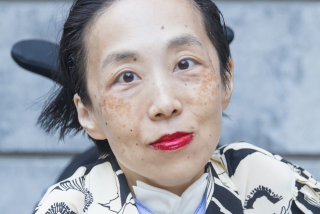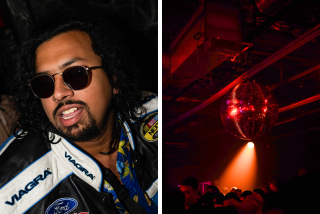Testimony : ONE PERSON’S STORY...
- Share via
I lost much of my hearing when I was 4 due to meningitis. My first memories are of being in the hospital, and I don’t remember what it was like to hear without a hearing aid. Then, after I turned 16, it got dramatically worse, and now I am legally deaf. I read lips and use an FM loop--a transmitter to hear my professors’ lectures. So I guess I’m what is called “disabled.”
It took me several years before I could ask people to speak up, face me and repeat themselves without feeling flustered or embarrassed. And that’s me, who has this relatively mild disability.
I would say that probably everyone who has a disability has at one point or another experienced self-hatred. Being “disabled” carries all these negative connotations of self worth--not meeting society’s ideals of beauty and perfection.
Who defines what the ideal human is? If you take away our diversity, you’re robbing us of who we are. But discrimination against the disabled is more subtle than against other minorities. No one will say to their children, “Don’t stare at the black or Asian person.” But they will say, “Don’t stare at the boy in the wheelchair.”
A lot of people tend to avoid what we call the disabled. They feel uncomfortable around them because they don’t want to think about the possibility of something like that happening to them.
Nobody wants to face that the body is mortal. So they marginalize the disabled to prop up this myth about the perfection of the physical body and the attainment of eternal youth.
The only way you can reconcile social norms and values of perfection with the actual presence of the disabled is to make them the abnormal ones. The disabled are the aberration. They are the misfits. They are not supposed to be there.
This viewpoint ignores the fact that disabilities are an integral part of the human experience. Every person, if they live long enough, will experience it. What somebody who is non-disabled would call a disability, I would call a normal biological variation. That is a part of the human experience. We will all grow old and get arthritis and age spots and lose our hearing, lose our eyesight and maybe break our hips and have to use wheelchairs.
In high school, I remember going out with someone whose mother did not want him to ever marry me because, she said, he will never be able to take me to loud restaurants and movies. That’s important to what she sees as normal life.
In focusing on my disability and what that meant socially, she ignored everything about me that was worthwhile and valuable. She basically made me into this person who was undesirable because I didn’t fit into her conception of what a normal person should do.
There is a similar problem with employers who don’t want to hire people who have disabilities because they think, “Oh, if I hire this person I’ll have to do all this other stuff . . . all these negatives.” They focus only on that and not what the person can bring as a whole.
I don’t let my disability dominate me. I’m the editor of the paper because of who I am and that’s a part of what I am. But it’s not everything. Most of the time I don’t think about being hearing impaired. It’s just who I am and what I do.
Treatment of the disabled is definitely not the biggest issue on this campus. The fact that the regents are selling our land to developers, cutting staff and raising tuition is far more important. They are undermining the constitutional reason for founding the UC system, which was to provide a quality, affordable education. But it is a scandal that we have 250 locations with structural barriers.
There are people who think we shouldn’t have to build ramps to make everything accessible for everyone. And that sort of attitude is what makes disability a handicap. If you have a wheelchair and there are ramps, you can work, you can go to the supermarket, you can function in society. You have that technology that makes you capable of functioning in society. But you cannot do that unless the social environment in which you are in is accessible to you.
Your handicap is defined by the restrictions social organization puts on your life. I’m not handicapped as long as people are willing to speak up, as long as I have hearing aids, as long as I have an FM loop, I can do everything I want to do. I can run the newspaper. I can do all that only as long as the social environment is accessible to me.
Sometimes you hear complaints about all these things that have to be done. That attitude ignores the fact that the only reason that all these things have to be done for disabled people is because in the past, society was not willing to do them. The university should have been built with ramps in the first place.
More to Read
Sign up for Essential California
The most important California stories and recommendations in your inbox every morning.
You may occasionally receive promotional content from the Los Angeles Times.













